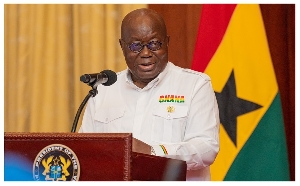Opinions of Friday, 22 March 2024
Columnist: Enimil Ashon
John Kumah’s death: The media verdict
The invention of writing ink 4,500 years ago, the discovery of radio waves by German physicist Heinrich Hertz in the 19th century, and the switching on of the first television set by Philo Farnsworth in 1927 all marked the birth of crusading journalism. God created journalism to expose the deeds of evil men.
Good journalists are crime solvers; the more fearless and less buyable they are, the more profitable they are for society.
Many an elusive criminal case has been cracked, thanks to the tireless search for the truth by sleepless journalists.
The never-give-up spirit of Carl Bernstein and Bob Woodward's 1972 investigation into the Watergate scandal exposed the political crimes of President Richard Nixon, leading to his resignation and the indictment of 40 White House officials.
For three years, journalist David A. Yallop snooped around the hallowed corridors of the Vatican.
The result was his book, ‘In God's Name’, which exposed the murder of Pope John Paul II on September 28, 1978
As a journalist myself, therefore, it would not only be unrighteous but also unprofessional to rail an accusation against Captain Smart of Onua TV or any other journalist for smelling crime in the death of former Deputy Finance Minister, John Kumah, and mounting a crusade in his effort to prove that the death was an act of murder.
Uncovering crime is the sacred duty of all journalists of conscience.
Evidence:
What Captain Smart or any other journalist has no right to do, however, is to allege murder on mere suspicion or hearsay.
In journalism, the name of the game is evidence.
It is not rumour, gossip, or even suspicion.
Gathering evidence is a painstaking undertaking; often, it takes years.
Once upon a time, journalism taught that “if in doubt, leave out.”.
Of course, our bosses were not expecting us to leave without a fight; it was a call to strain for the facts.
Today, it seems to be, if in doubt, published.
No matter how shrill today’s media sounds, this is not journalism; it is something else, and my pain is that our society is falling for “something else.”.
No wonder social media is so "successful.”.
David A. Yallop gathered evidence over three years to conclude that the Pope was murdered. Reading the book ‘All the President’s Men’ (and later the movie by that title), one is amazed by the journalists’ relentless pursuit of truth, including interviews with Deep Throat.
For them, it was a search for evidence, and until there was evidence, it was too soon and too premature to open their mouth or put pen to paper.
If John Kumah’s death is a murder case, it does not matter how soon after his death Captain Smart broke it.
Criminality:
But was the deceased poisoned? Even if there was poison in the food, was it criminally intended?
The police have files full of cases of people who died after eating poisoned food.
The difference, in many cases, turned out to be that it was a tin of sardines opened, half emptied, and the remaining left in the can for the refrigerator.
Overnight, it is likely chemical and biological processes led to decomposition that led to food poisoning.
So though it was found out that Esi, Kwame, or Efo Kwadwo placed the sardines in the fridge, they could, in all good conscience, not be accused of criminally poisoning the deceased.
Yours truly cannot conclusively say John Kumah was not poisoned, but I can also, in the light of available evidence, which I cannot controvert, and in fairness to good conscience, announce, or even infer through innuendoes, that John Kumah “was poisoned.”.
I don’t know more about journalism than Captain Smart, but before I go on air to announce murder, I would do what ancient practitioners of best practices did: they investigated.
Time will tell, and one day, it might be confirmed that John Kumah was criminally poisoned.
That, still, would not defeat the principle behind the Ghana Journalists Association (GJA) Code of Ethics promulgated on July 27, 1994.
Article 3 of the Code enjoins journalists to make adequate inquiries and cross-check their facts.
Medical records:
Autopsy records have ruled out poisoning.
Medical records made available by the wife of the deceased have stated in black and white that the man had long been diagnosed in German and Swedish hospitals with and was being treated for “multiple myeloma," a type of cancer.
I can appreciate the counterargument of a crusading journalist who might insist that in addition to the “multiple myeloma," there was also poisoning.
What is the evidence?:
Imagine the level of suspicion this “poison” claim could have planted in the minds of Kumah’s wife and children against his close associates and party members if the family were not seized with the facts they had.
All because someone went public too soon with suspicions and rumours.
Meanwhile, ladies and gentlemen, what do we make of this revelation that the “famous” prophet who prophesied the death of John Kumah was, after all, a close family friend who was privy to the deceased's condition? I tell you, dear readers, God is losing admirers.
Entertainment












